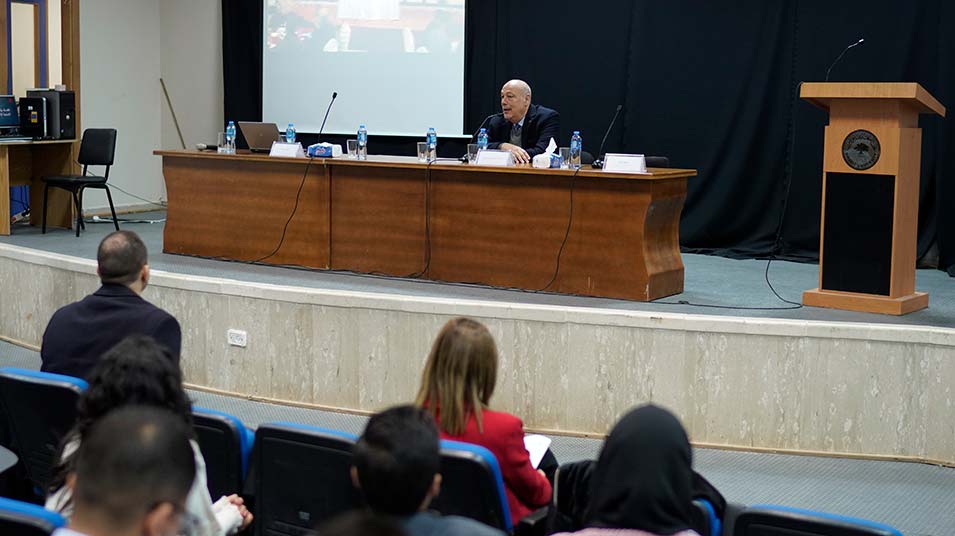Closing workshop of national dialogue project explores effects of Palestinian political split
The project titled “National Dialogue with and through Universities and Community Social Organization in Palestine” concluded with a workshop, held at Birzeit University and connected to Gaza via videoconference, on December 9, 2019.
Funded by the Swiss government, the national dialogue project connected in a cooperative endeavor Birzeit University’s Ibrahim Abu-Lughod Institute of International Studies with Al-Azhar University, Gaza; Islamic University of Gaza; Pal-Think for Strategic Studies, Gaza; and Swisspeace, a practice-oriented peace research institute operating from Bern and Basel, Switzerland.
Abderrahman Ibrahim, dean of Birzeit University’s Faculty of Law and Public Administration, inaugurated the workshop by asserting that students in Gaza and in the West Bank have the capability to generate new ideas and to create research that will help tighten the gap caused by the Palestinian political dispute and split.
Palthink Director Omar Shaban stressed the important role that students play in Gaza and in the West Bank with respect to resolving the Palestinian split. He stated that “Student movements and universities are part and parcel of Palestine’s identity; they have contributed to the struggle against the occupation and should engage in the same manner to resolve political disputes in Palestine.”
The closing workshop featured students from the participating universities, who presented the outcomes of their research papers on the impact of the Palestinian split on students in the West Bank and Gaza.
The workshop featured three main sessions, two of which included interventions of students. The first session, moderated by Huthyfa Hamed and Hasan Sisalem, featured interventions of Izz Aldeen Quota (Islamic University), Fairouz Salameh and Mohammad Jouda (Birzeit University), and Ala’ Abu Swaireh (Al-Azhar University). The students discussed the impact of the Palestinian split on students by exploring issues such as political detention, political censorship, restrictions on free speech, and the obstacles that democratic student council elections at a number of Palestinian universities have encountered.
The first session also featured Abdel Hadi Sadiq (Islamic University) who displayed his artistic approach towards criticism of the Palestinian split through a video.
The second session discussed the impact of the split on the Palestinian economy and on elections under the moderation of Rami Khdoor and Haitham Bodair. The students Amal Manasrah (Al-Azhar University), Lina Ashour (Islamic University), and Fouad Rasheed (Birzeit University) attributed several economic issues to the Palestinian split, mentioning Gaza’s financial crisis, the prevaling lack of government support, and unrecognized universities in Gaza that are awaiting the ministry of education’s approval to this day.
The final session shed light on how the Palestinian split impacts on academia and education. Omar Shaban and Marah Khalaf moderated this session that featured professors Lorde Habash (Birzeit University), Waleed Amodalla (Islamic University), and Abdraboh Alenzy (Al-Azhar University). A video display, presented jointly by students from Gazan universities and Birzeit University.







